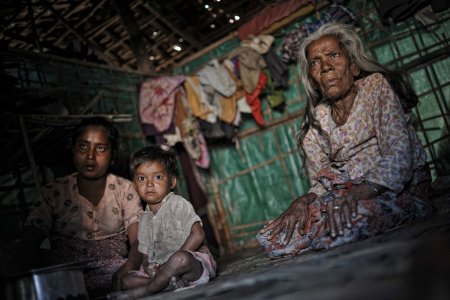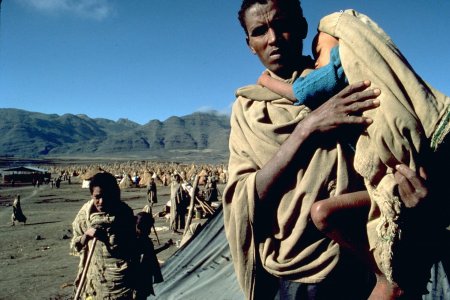
In Cox’s Bazar
Michaël Neuman
This article was published in the London Review of books website on September 8, 2023. The former evokes the dire conditions in which roughly 1 000 000 Rohingyas live in Cox’s Bazar, the largest refugee camp in the world. In this coastal district in south-east Bangladesh, the humanitarian deployment is impressive, but commitment by donors is waning. Between March and June, monthly food allocations fell from $12 to $8 per person. The difficulties of accessing care, the social control to which they are subjected and the lack of prospects are many reasons explaining the perils faced by the Rohingya population.
Six years ago, hundreds of thousands of Rohingya refugees left Rakhine State in Myanmar (formerly Burma). Roughly 200,000 had already fled to Bangladesh when the Burmese army launched a cleansing operation against the Rohingyas in 2017. By the end of that year, more than 700,000 more had arrived in Cox’s Bazar, a coastal district in south-east Bangladesh.
To accommodate the Rohingyas, hills were levelled, thousands of hectares of trees were felled, tens of thousands of shelters were erected, latrines were dug, boreholes were drilled and clinics were set up. Kutupalong-Balukhali – or just Kutupalong, as uprooted Rohingyas and long-term residents of Cox’s Bazar refer to it – is the largest refugee camp in the world. It consists of several contiguous camps with central thoroughfares in brick and cement leading off into narrow alleyways where families live in small dwellings made from bamboo and tarpaulin; some are built on slopes, at risk of landslides during the monsoon season.
Untreated water is plentiful – so are the rains in Bangladesh – but access to drinking water is limited to a few hours a day; disputes at the purified water outlets are common. Rohingya shops are flourishing, but like every refugee initiative in the camp, they are at the mercy of the Bangladeshi police, who can close them on the grounds that they have not been authorised by the government in Dhaka. Barbed-wire fences at their limits define this cluster of camps as a single circumscribed shanty town.
Despite a history of hostile relations with Myanmar and forced repatriations of Burmese nationals, Bangladesh has opened the door to Rohingyas, as they struggle against extinction, but it subjects them to a range of social controls, including restrictions on the building of schools in the camps and obstacles to registering births; their movements, even from one camp to another within Kutupalong, are highly circumscribed; they are forbidden to work, though a great many do, yet they remain at the mercy of the police, baksheesh and arrests. The government’s approach to the camps is an ambiguous mix of tolerance – despite waves of popular xenophobia, often stoked by politicians – and real-life prohibitions, enforced more or less strictly, depending on the mood at both national and local level: this elasticity leaves Rohingyas in a state of perpetual uncertainty.
The activities of Rohingya criminal gangs are frequently a pretext for tightening the rules. These groups are in open conflict for control of ya ba trafficking. Ya ba, a mixture of methamphetamine and caffeine, is mainly produced in Myanmar but Bangladesh is one of the principal markets. Although Bangladeshis do most of the trafficking, ya ba is responsible for escalating gang warfare in the camps and insecurity for the refugees. Last August I met two children, aged five and seven, wounded by stray fire from a gang shoot-out. A bullet passed through both the boy’s legs and his sister’s lower back. News of drug-based violence in the camps fuels anti-Rohingya sentiment among Bangladeshis.
The humanitarian deployment is impressive, but commitment by donors is waning. Between March and June, monthly food allocations – cash payments received on a SIM card – fell from $12 to $8 per person. As of last month, the Joint Response Plan drawn up by the UN and Dhaka is only 30 per cent funded. Rising malnutrition levels, bad health outcomes, an increase in drug trafficking and a tendency for young men in the camps to join armed factions will be some of the consequences. Health centres and hospitals are already overflowing; low birth weights recorded in maternity wards are on the rise: every year, around 30,000 babies are born in Kutupalong.
What does it mean to be a Rohingya in these camps? Fighting to obtain a birth certificate for your child; arguing – sometimes coming to blows – at the water points; looking for ways to supplement your monthly food allocation, contracting debts at ominous interest rates; risking arrest or extortion for trying to leave the camp for a day’s work. The elderly and disabled as well as single women with children are sometimes forced to pay for help with tasks they can’t manage on their own (home repairs, carrying 24-kilogramme gas bottles from distribution points), despite dedicated services that are supposed to meet some of these needs. Access to legal employment, through one of many organisations in the camps that favours educated or anglophone Rohingyas, highlights the worrying levels of inequality among the refugees, as does access to illegal work outside the camp. Women are vulnerable to rape and violence, often unreported and thus under-recorded.
The survival of the Rohingya nation in these conditions would be miraculous. Most hope to return to Myanmar, but this step can only be taken when their land and nationality, of which they were deprived in 1982, are restored. Some have taken their chances and gone back, exposing themselves to the risk of renewed persecution. A handful have benefited from rare opportunities to resettle in other countries, such as Canada or the US, but the Bangladeshi government suspended the resettlement programme in 2010, arguing that it would act as a ‘pull factor’. Recent initiatives to restart the process have been timid. The alternative is the risky land and sea crossing to Malaysia, which growing numbers of Rohingyas in Kutupalong see as their salvation.
To cite this content :
Michaël Neuman, “In Cox’s Bazar”, 31 octobre 2023, URL : https://msf-crash.org/en/camps-refugees-idps/coxs-bazar
If you would like to comment on this article, you can find us on social media or contact us here:
Contribute


